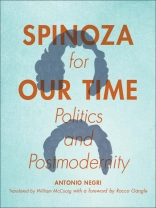Antonio Negri, one of the world’s leading scholars on Baruch Spinoza (1632–1677) and his contemporary legacy, offers a straightforward explanation of the philosopher’s elaborate arguments and a persuasive case for his ongoing relevance. Responding to a resurgent interest in Spinoza’s thought and its potential application to contemporary global issues, Negri demonstrates the thinker’s special value to politics, philosophy, and related disciplines.
Negri’s work is both a return to and an advancement of his initial affirmation of Spinozian thought in The Savage Anomaly. He further defends his understanding of the philosopher as a proto-postmodernist, or a thinker who is just now, with the advent of the postmodern, becoming contemporary. Negri also connects Spinoza’s theories to recent trends in political philosophy, particularly the reengagement with Carl Schmitt’s ‘political theology, ‘ and the history of philosophy, including the argument that Spinoza belongs to a ‘radical enlightenment.’ By positioning Spinoza as a contemporary revolutionary intellectual, Negri addresses and effectively defeats twentieth-century critiques of the thinker waged by Jacques Derrida, Alain Badiou, and Giorgio Agamben.
Tabla de materias
Foreword, by Rocco Gangle
Translator’s Note
Introduction: Spinoza and Us
1. Spinoza: A Heresy of Immanence and of Democracy
2. Potency and Ontology: Heidegger or Spinoza
3. Multitude and Singularity in the Development of the Spinoza’s Political Thought
4. Spinoza: A Sociology of the Affects
Notes
Bibliography
Index
Sobre el autor
Antonio Negri (1933–2023) was an Italian philosopher and political activist. He was a prominent figure in the left-wing operaismo movement in the 1960s and ’70s. He is best known for his writings on globalization—particularly the highly influential volume Empire (co-authored with Michael Hardt)—but he also wrote on subjects as various as Vladimir Lenin, Baruch Spinoza, and the Book of Job.












